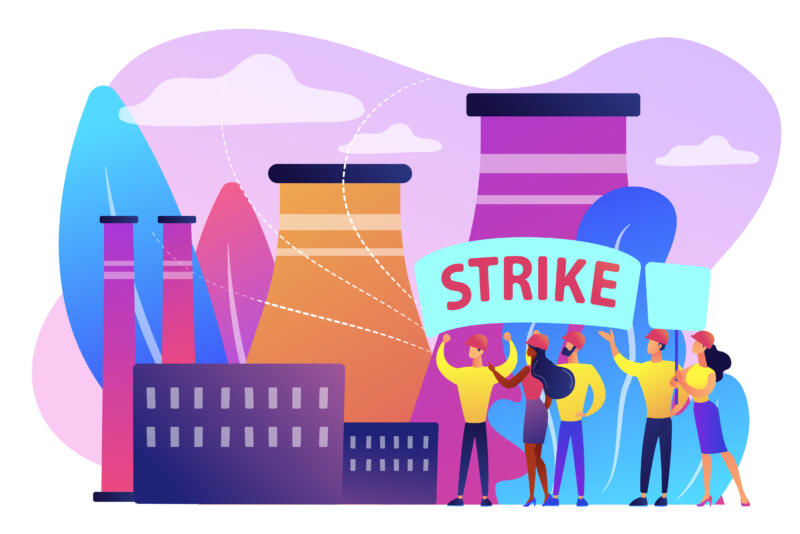History Being Repeated – The Uptake in Unionizing for Wages
The world of work is shapeshifting left and right, with new technologies and economic forces transforming the labor market. The economy is prospering, but it’s also taking a toll in other ways. The wealthy are getting wealthier and the rest are having to suffer with inflation, so why can’t workers make a living wage with the growing economy? Why must they still live paycheck to paycheck with no job security? Why does history seem to repeat itself?
In a media briefing, hosted by Ethnic Media Services on July 28, a diverse panel of experts came together to discuss these changes and explore the role of unions, democracy, and equity in the 21st-century workplace. Featuring former labor leaders, professors, and writers, the panel offered a range of perspectives on the challenges facing workers today and the strategies that can be used to build a more just and equitable society for all. From the impact of technology on the labor market to the importance of collective action and racial and gender equity, the panelists explored a wide range of topics that are essential to understanding the future of work in the 21st century.
Speakers

- Maria Elena Durazo, California State Senator, 26th District. Ex-Secretary-Treasurer of the Los Angeles County Federation of Labor, AFL-CIO
- Nelson Lichtenstein, Research Professor in the Department of History at UCSB, Center for the Study of Work, Labor, and Democracy
- Ada Briceño, Co-President, UNITE HERE Local 11
- Lucero Ramirez, A hotel worker participating in walkouts
- Jorge Rivera, Vice-Chair of the Latinx Writers Committee, WGAW/TV Writer and Producer
- Harley Shaiken, Geography and Education, UC Berkeley.
STORY
Technology is constantly evolving, maybe we will see AI write code too. However, on the flip side, the labor market is jeopardized as machines can’t do it better and those people are out of a job. Lucero Ramirez talks about how the community, “have gone through what technology did to media and to the jobs of journalists,” erupting into significant job losses and wage stagnation. This is most prominent in industries that have adopted automation and outsourcing.
Despite these challenges, the panelists emphasized the importance of organizing and collective action in the face of these changes. As former labor leader Dolores Huerta noted, “we need to build a movement that is not just about individual rights, but about collective rights.” This movement should focus on building solidarity across different sectors of the economy, as well as across different racial and ethnic groups.
A workplace should not end up becoming dictatorial. They should, much like our government, be some democracy. Harley Shaiken emphasized the need for workers to have a voice in the decisions that affect their lives and livelihoods. Not only does this include the right to unionize and bargain collectively, but also the right to participate in decision-making processes at the company level.
Shaiken believes democracy “is not just about voting, it’s about having a say in the decisions that affect your life.” Workers should have a voice in everything, from workplace safety to the allocation of profits. Workers should additionally have the right to participate in the governance of the companies they work for, whether through worker-owned cooperatives or other forms of democratic ownership.
A reoccurring theme seen in many of the social issues is the need for gender and racial equality. Maria Elena Durazo suggests that we, “recognize that the labor movement has historically excluded women and people of color, and we need to work to change that.” Not only must we fight for equal pay and opportunities, but also address systemic barriers that prevent women and people of color from entering certain industries or advancing in their careers.
Overall, there’s a need for a broad-based movement that can address the complex challenges facing workers and democracy in the 21st century. One of the most influential civil rights activists, Dolores Huerta, believed, “we need to build a movement that is not just about individual rights, but about collective rights,” and that was taken to heart. This movement should be inclusive and intersectional, recognizing how different forms of oppression intersect and compound one another.
As the panelists noted, the challenges facing workers and democracy in the 21st century are complex and multifaceted. However, by building a broad-based movement that is committed to collective action, democracy in the workplace, and racial and gender equity, we can begin to address these challenges and build a more just and equitable society for all. Harley Shaiken concluded, “unions are vital to a democratic society. They’re vital to a healthy economy.” By organizing and working together, workers can build a better future for themselves and for generations to come.


